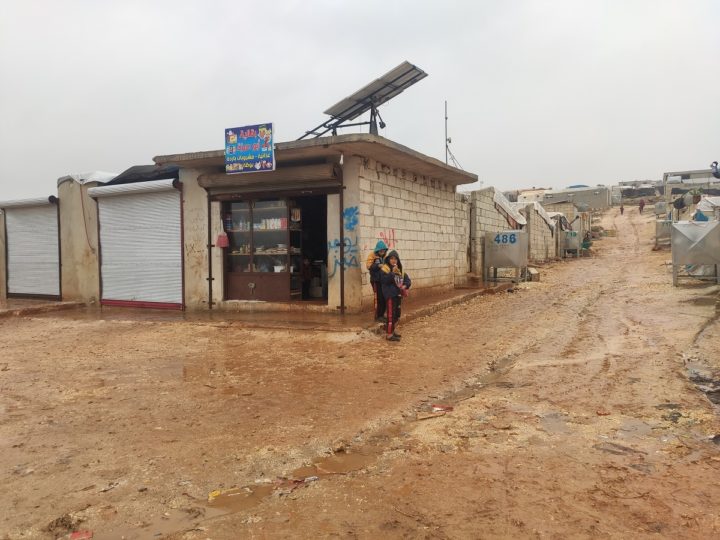The spotlight is elsewhere, but people are still dying in Syria and a whole generation of children does not know what it means to live in peace. On the 10th anniversary of the beginning of the conflict, we listen to the testimonies of those who live the horrors every day.
15 March 2011: On the walls of a school building in Daraa, a city in southern Syria, a group of teenagers painted some graffiti against the Assad regime. It is the time of the Arab Spring, and throughout the Middle East there is a strong desire for change and freedom. The government arrested and tortured them, sparking protests not just in Daraa but throughout the country as they were met with violence and arrests. The escalation led Syria to the outbreak of a civil war capable of destroying an entire nation. They dreamed of freedom, but even today, 15 March 2021, the conflict is still far from being resolved.
«A decade of bombs, torture, displacement, resulting in 400,000 deaths, more than 6.6 million internally displaced people and 5.5 million people fleeing abroad. Eighty percent of the population lives in poverty, and more than 12 million Syrians today have no regular access to drinking water. It is impossible to describe in words the devastation of 10 years of war, passed in the most deafening silence», denounces Giulia Cicoli, Advocacy Director of Still I Rise.
The war in Syria is less and less talked about. Yet the bombings continue every day. Every day, people lose their lives or are injured. According to recent data from OCHA, between January and February there were dozens of ground attacks and explosions in North-West Syria, resulting in 29 deaths and over a hundred injuries. The main victims are children. Every day, these people hope that the international community will remember Syria, and intervene to end the conflict. But that day never comes.
«I am from Aleppo and from my city I had to flee in 2016. I resisted there for five years, after the war started, because I wanted to raise my people’s voice, calling only for freedom. I wanted to make known our suffering and pain. And I saw things that a human mind can’t bear», says Abdulkafi Alhamdo, Program Coordinator of Still I Rise in North West Syria. «We all thought it would be over in one, two or three months. We all thought that soon the world would mobilise to defend civilians, to protect the human rights that are so much talked about in the newspapers and on TV. But the reality is different. Nobody has moved to defend human rights».
There are children who have seen nothing but war in their lives. They were born under bombs and have no idea of what it means to live in a country at peace. In the Ma’an educational centre of Still I Rise, in the city of Ad Dana, boys and girls aged 10 to 14 experienced, for the first time, what it means to go to school only a few months ago. Despite the fact that child labour is a widespread scourge, the organisation tries to get the children into school desks. It distributes food packages to families, so their children can leave their jobs and attend classes. But this is not always enough, and is often just a drop in the ocean.
Hasan, for example, is a 14 year old boy and the eldest of four siblings. He has to support his family since his father passed away. He wakes up early in the morning, waits for the school bus to take him to Ma’an. There he attends classes in English, Arabic, as well as mathematics classes. In the afternoon he comes home, changes his clothes and goes to work until 7 pm. «I feel sad when I see children of my own age who can play or watch television. This war not only hurts me, it destroys me, as it destroys so many people. I would like to say to the world: please think of us! So many Syrian children are forced to work from an early age. Only a few manage to go to school, because many are orphans and have to go to work early».
Marah, a 12 year old girl, echoes him. She was forced to leave her home with her family and it was the most difficult moment for her. «My friends and other relatives are far away, we are all scattered around the country». Now she lives as a displaced person in a tent, without electricity, exposed to the cold and bad weather of winter. Yet she dreams of graduating one day, becoming a good English teacher and perhaps returning to her village to teach children.
«We need to turn the spotlight back on Syria. Not only this week, when we remember a macabre anniversary of 10 years of war, but every day», Giulia Cicoli concludes. «Where is the international community? Where are human rights? Where are the rights of children? Several international powers are involved in Syria and it is politically a very difficult conflict to resolve, but as always in wars, it is the civilians who suffer. Enough is enough».
WATCH THE VIDEO
Https://www.youtube.com/watch?V=io_kahd_fsi






